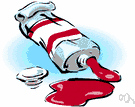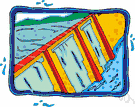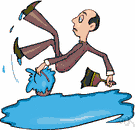spill 1
(spĭl)v. spilled or spilt (spĭlt), spill·ing, spills
v.tr.
1. To cause or allow (a substance) to run or fall out of a container.
2. To scatter (objects) from containment: spilled the armload of books on the desk.
3. To shed (blood).
4. Nautical
a. To relieve the pressure of wind on (a sail).
b. To cause or allow (wind) to be lost from a sail.
5. To cause to fall: The rider was spilled by his horse.
6. Informal To disclose (something previously unknown); divulge: The witness spilled all the details about the suspect.
v.intr.
1. To run or fall out of a container or containment.
2. To come to the ground suddenly and involuntarily.
3. To pour out or spread beyond limits: Fans spilled onto the playing field.
n.
1. The act of spilling.
2. An amount spilled.
3. A fall, as from a horse.
4. A spillway.
[Middle English spillen, to shed blood, to spill, from Old English spillan, to kill.]
spill′er n.
spill 2
(spĭl)n.
1. A piece of wood or rolled paper used to light a fire.
2. A small peg or rod, especially one used as a plug; a spile.
[Middle English spille.]
American Heritage® Dictionary of the English Language, Fifth Edition. Copyright © 2016 by Houghton Mifflin Harcourt Publishing Company. Published by Houghton Mifflin Harcourt Publishing Company. All rights reserved.
spill
(spɪl)vb (mainly tr) , spills, spilling, spilt or spilled
1. (when: intr, usually foll by from, out of, etc) to fall or cause to fall from or as from a container, esp unintentionally
2. to disgorge (contents, occupants, etc) or (of contents, occupants, etc) to be disgorged: the car spilt its passengers onto the road; the crowd spilt out of the theatre.
3. (Medicine) to shed (blood)
4. informal Also: spill the beans to disclose something confidential
5. (Nautical Terms) nautical to let (wind) escape from a sail or (of the wind) to escape from a sail
n
6. informal a fall or tumble
7. (Civil Engineering) short for spillway
8. a spilling of liquid, etc, or the amount spilt
9. (Government, Politics & Diplomacy) Austral the declaring of several political jobs vacant when one higher up becomes so: the Prime Minister's resignation could mean a Cabinet spill.
[Old English spillan to destroy; related to spildan, Old High German spaltan to split; see spoil]
ˈspiller n
spill
(spɪl)n
1. a splinter of wood or strip of twisted paper with which pipes, fires, etc, are lit
2. (Tools) a small peg or rod made of metal
[C13: of Germanic origin; compare Old High German spilla, Middle Dutch spile stake]
Collins English Dictionary – Complete and Unabridged, 12th Edition 2014 © HarperCollins Publishers 1991, 1994, 1998, 2000, 2003, 2006, 2007, 2009, 2011, 2014
spill1
(spɪl)v. spilled spilt, spill•ing, v.t.
1. to cause or allow to run or fall from a container, esp. accidentally or wastefully: to spill a glass of milk.
2. to shed (blood), as in killing or wounding.
3. to scatter: to spill papers all over the floor.
4.
a. to let the wind out of (a sail).
b. to lose (wind) from a sail.
5. to cause to fall from a horse, vehicle, or the like.
6. to divulge: to spill a secret.
v.i. 7. (of a liquid, loose particles, etc.) to run or escape from a container, as by careless handling.
8. to move in great numbers; pour out: The children spilled into the playground.
n. 9. a spilling, as of liquid.
10. a quantity spilled.
11. spillway.
12. Also called spill′ light`. superfluous or useless light rays, as from photographic lighting units.
13. a throw or fall from a horse, vehicle, or the like.
[before 950; Old English spillan, c. Middle Dutch, Middle Low German spillen, akin to Old English spildan to destroy]
spill′a•ble, adj.
spill2
(spɪl)n.
1. a splinter.
2. a slender piece of wood or of twisted paper, for lighting candles, lamps, etc.
3. a peg made of metal.
4. a small pin for stopping a cask; spile.
[1250–1300; Middle English spille]
Random House Kernerman Webster's College Dictionary, © 2010 K Dictionaries Ltd. Copyright 2005, 1997, 1991 by Random House, Inc. All rights reserved.
Spill
a small quantity of money—Johnson, 1755; a small amount of spilt liquid.Examples: spill of heart’s blood, 1848; of money, 1707; of rain, 1888.
Dictionary of Collective Nouns and Group Terms. Copyright 2008 The Gale Group, Inc. All rights reserved.
spill
Past participle: spilled/spilt
Gerund: spilling
| Imperative |
|---|
| spill |
| spill |
Collins English Verb Tables © HarperCollins Publishers 2011
ThesaurusAntonymsRelated WordsSynonymsLegend:
| Noun | 1. |  spill - liquid that is spilled; "clean up the spills" spill - liquid that is spilled; "clean up the spills"liquid - fluid matter having no fixed shape but a fixed volume |
| 2. |  spill - a channel that carries excess water over or around a dam or other obstruction spill - a channel that carries excess water over or around a dam or other obstructionconduit - a passage (a pipe or tunnel) through which water or electric wires can pass; "the computers were connected through a system of conduits" | |
| 3. | spill - the act of allowing a fluid to escape | |
| 4. |  spill - a sudden drop from an upright position; "he had a nasty spill on the ice" spill - a sudden drop from an upright position; "he had a nasty spill on the ice"pratfall - a fall onto your buttocks wipeout - a spill in some sport (as a fall from a bicycle or while skiing or being capsized on a surfboard) | |
| Verb | 1. | spill - cause or allow (a liquid substance) to run or flow from a container; "spill the milk"; "splatter water" disgorge, shed, spill - cause or allow (a solid substance) to flow or run out or over; "spill the beans all over the table" |
| 2. | spill - flow, run or fall out and become lost; "The milk spilled across the floor"; "The wine spilled onto the table" slop, spill, splatter - cause or allow (a liquid substance) to run or flow from a container; "spill the milk"; "splatter water" | |
| 3. | spill - cause or allow (a solid substance) to flow or run out or over; "spill the beans all over the table" seed - go to seed; shed seeds; "The dandelions went to seed" | |
| 4. | spill - pour out in drops or small quantities or as if in drops or small quantities; "shed tears"; "spill blood"; "God shed His grace on Thee" pour - cause to run; "pour water over the floor" | |
| 5. | spill - reveal information; "If you don't oblige me, I'll talk!"; "The former employee spilled all the details" babble out, blab, blab out, let the cat out of the bag, peach, spill the beans, tattle, babble, talk, sing - divulge confidential information or secrets; "Be careful--his secretary talks" tell - let something be known; "Tell them that you will be late" | |
| 6. | spill - reduce the pressure of wind on (a sail) sailing - riding in a sailboat |
Based on WordNet 3.0, Farlex clipart collection. © 2003-2012 Princeton University, Farlex Inc.
spill
verb
1. tip over, upset, overturn, capsize, knock over, topple over He always spilled the drinks.
2. shed, scatter, discharge, throw off, disgorge, spill or run over A number of bags had split and were spilling their contents.
spill someone's blood slay, kill, murder, destroy, waste (informal), do in (slang), take out (slang), execute, massacre, butcher, slaughter, dispatch, assassinate, eradicate, do away with, blow away (slang, chiefly U.S.), obliterate, knock off (slang), liquidate, annihilate, neutralize, exterminate, take (someone's) life, bump off (slang), extirpate, wipe from the face of the earth (informal) He is prepared to spill the blood of a million people.
spill the beans (Informal) blab, inform, squeal (slang), tell all, shop (slang, chiefly Brit.), sing (slang, chiefly U.S.), split (slang), grass (Brit. slang), give the game away, tattle, let the cat out of the bag, blow the gaff (Brit. slang), talk out of turn, spill your guts (slang), betray a secret He was ready to spill the beans about the whole affair.
Collins Thesaurus of the English Language – Complete and Unabridged 2nd Edition. 2002 © HarperCollins Publishers 1995, 2002
spill
verb2. To come to the ground suddenly and involuntarily:
Idiom: take a fall.
The American Heritage® Roget's Thesaurus. Copyright © 2013, 2014 by Houghton Mifflin Harcourt Publishing Company. Published by Houghton Mifflin Harcourt Publishing Company. All rights reserved.
Translations
يُريق، يَدلُقيُهْرِقُ
rozlítvysypat se
spilde
läikyttäälevitäpäästääkaataaläikkyä
proliti
kiloccsan
hella niîur, hellast
こぼす
...을 엎지르다
išlietiišsilietiišsipilti
izlietizšļakstītizšļakstīties
rozliaťvysypať sa
razliti se
spilla
ทำหก
dökmekdökülüp saçılmak
làm đổ
spill
1 [spɪl] (spilled or spilt (pt, pp))A. VT
1. [+ water, salt] → derramar, verter
you're spilling the milk → estás derramando la leche
you've spilled or spilt coffee on your shirt → te ha caído café en la camisa
she spilled or spilt wine all over the table → derramó el vino por toda la mesa
to spill the beans → descubrir el pastel, contarlo todo
see also cry B2
you're spilling the milk → estás derramando la leche
you've spilled or spilt coffee on your shirt → te ha caído café en la camisa
she spilled or spilt wine all over the table → derramó el vino por toda la mesa
to spill the beans → descubrir el pastel, contarlo todo
see also cry B2
2. [+ rider] → hacer caer, desarzonar
B. VI → derramarse, verterse
C. N
2. (= spillage) → vertido m
spill out
A. VI + ADV [liquid] → derramarse; [contents, objects] → desparramarse; [people] → salir en avalancha
the crowd spilled out into the streets → la gente salió a la calle en avalancha
the audience spilled out of the cinema → el público salió en masa del cine
the crowd spilled out into the streets → la gente salió a la calle en avalancha
the audience spilled out of the cinema → el público salió en masa del cine
spill over VI + ADV [liquid] → derramarse; [cup, pan] → desbordarse
these problems spilled over into his private life → estos problemas llegaron a afectar su vida privada
these problems spilled over into his private life → estos problemas llegaron a afectar su vida privada
spill
2 [spɪl] N (for lighting fire) → pajuela fCollins Spanish Dictionary - Complete and Unabridged 8th Edition 2005 © William Collins Sons & Co. Ltd. 1971, 1988 © HarperCollins Publishers 1992, 1993, 1996, 1997, 2000, 2003, 2005
spill
[ˈspɪl] [spilled] (pt, pp) [spilt] (pt, pp) (mainly British) vt [+ liquid, salt, sand] → renverser, répandre
He spilled his coffee over his trousers → Il a renversé son café sur son pantalon.
to spill sb's blood → faire couler le sang de qn
to spill the beans (= let out a secret) → vendre la mèche (= confess) → lâcher le morceau
He spilled his coffee over his trousers → Il a renversé son café sur son pantalon.
to spill sb's blood → faire couler le sang de qn
to spill the beans (= let out a secret) → vendre la mèche (= confess) → lâcher le morceau
vi
[liquid, salt, sand] → se répandre
The soup spilled all over the table → La soupe s'est répandue sur la table.
The soup spilled all over the table → La soupe s'est répandue sur la table.
n [liquid]
She wiped a spill of milkshake off the counter → Elle essuya le comptoir pour enlever du milkshake qui s'était renversé.
She wiped a spill of milkshake off the counter → Elle essuya le comptoir pour enlever du milkshake qui s'était renversé.
spill out
vt sep [+ problems, words] → déverser
He spilled out his problems to Philip → Il déversa ses problèmes auprès de Philip.
He spilled out his problems to Philip → Il déversa ses problèmes auprès de Philip.
vi [words] → se déverser
The words spilled out in a rush → Les mots se déversaient avec précipitation.
The words spilled out in a rush → Les mots se déversaient avec précipitation.
spill over
vi [water] → déborder
Collins English/French Electronic Resource. © HarperCollins Publishers 2005
spill
1 vb: pret, ptp <spilt (esp Brit) or spilled>n
vt
(= water, sand, salt etc) → verschütten; to spill somebody’s blood → jds Blut vergießen; to spill the beans → alles ausplaudern, plaudern; to spill the beans about something → etw ausplaudern
vi → verschüttet werden; (large quantity) → sich ergießen; (tears) → strömen, laufen; (fig: people) → strömen; the milk spilled all over the carpet → die Milch war auf dem ganzen Teppich verschüttet; light spilled into the room → Licht strömte ins Zimmer; light spilled under the door → Licht drang durch den Türspalt herein
spill
2Collins German Dictionary – Complete and Unabridged 7th Edition 2005. © William Collins Sons & Co. Ltd. 1980 © HarperCollins Publishers 1991, 1997, 1999, 2004, 2005, 2007
spill
[spɪl] (spilled or spilt (pt, pp)) [spɪlt]1. vt (gen) → rovesciare, versare; (blood) → spargere
to spill the beans (fam) → spiattellare tutto, vuotare il sacco
to spill the beans (fam) → spiattellare tutto, vuotare il sacco
2. vi → rovesciarsi, versarsi
spill out
1. vi + adv → uscire fuori; (fall out) → cadere fuori
the audience spilt out of the cinema → gli spettatori si riversarono fuori dal cinema
the audience spilt out of the cinema → gli spettatori si riversarono fuori dal cinema
2. vt + adv (contents) → rovesciare (fig) (story) → rivelare
spill over vi + adv to spill over (into) (liquid) → versarsi (in); (crowd) → riversarsi (in)
Collins Italian Dictionary 1st Edition © HarperCollins Publishers 1995
spill
(spil) verb – past tense, past participle spilt (-t) , spilled – to (cause something to) fall or run out (usually accidentally). He spilt milk on the floor; Vegetables spilled out of the burst bag.
spill the beans to give away a secret. By Monday it was evident that someone had spilled the beans to the newspapers.
Kernerman English Multilingual Dictionary © 2006-2013 K Dictionaries Ltd.
spill
→ يُهْرِقُ rozlít (se) spilde verschütten χύνω derramar läikyttää renverser proliti versare こぼす ...을 엎지르다 morsen søle rozlać derramar проливать spilla ทำหก dökmek làm đổ 溢出Multilingual Translator © HarperCollins Publishers 2009
spill
n. derrame;
v. derramar, verter.
English-Spanish Medical Dictionary © Farlex 2012